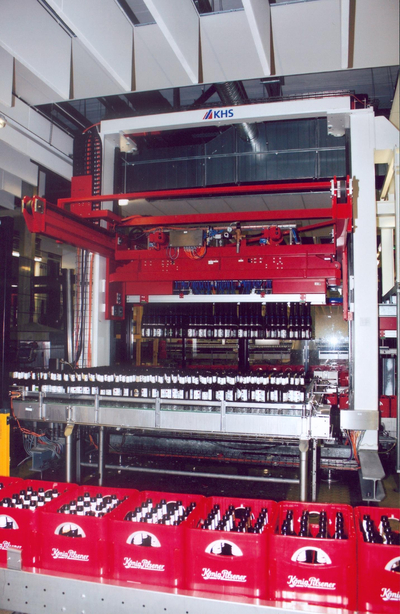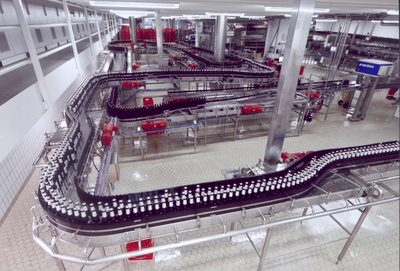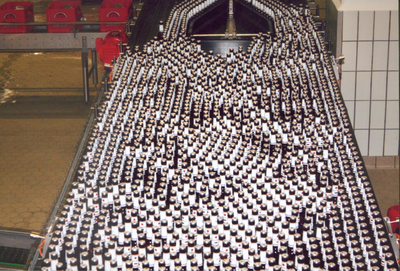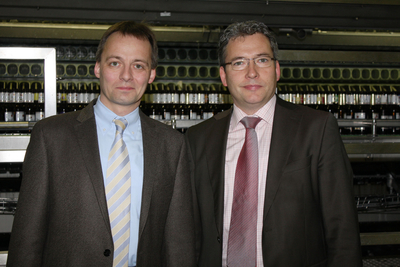
Only the Best for the "King of Beers"
König-Brauerei invests in quality from KHS
Günter Unkrig*
Wolfgang Augel**
In 1858 Theodor König founded König-Brauerei in Duisburg. In 2008, König- Brauerei celebrated its 150th anniversary. It also thanked the people of Duisburg, who have been and still are partly responsible for the present success of König, with a small gift; each household in Duisburg received a voucher for a six-pack of König Pilsener, König Pilsener Alkoholfrei (alcohol free) or König Pilsener Lemon, redeemable on a particular day in August of last year. Thirty percent of the public made use of the offer and personally picked up their six-pack at the brewery or at three other designated points in the city. Karin Sauer, Director of Corporate Communications at König-Brauerei, says "The big rush on our jubilee present demonstrates just how well our premium beer brand is accepted and how strongly the people of Duisburg identify with König-Brauerei." Guido Christiani, Production/Engineering Director of König-Brauerei, claims "We had to provide a huge number of six-packs for our jubilee campaign. We were able to effortlessly master this task partly thanks to our new KHS plant engineering."
From the Rhine and Ruhr to the rest of Germany
It's no coincidence that the people of Duisburg have such strong links with König-Brauerei. Right from the start, brewery founder Theodor König targeted his freshly brewed beer towards the working populace of the Rhine and Ruhr, basing his undertaking on the motto that those who've worked hard all day will appreciate a good beer in the evening. In 1858, König began with a beer output of just 206 hectoliters. By 1899, this figure had risen to 50,000 hectoliters. But it was above all a decision made by Theodor König at the beginning of the 20th century that the brewery is still profiting from today, namely that of introducing a pilsner beer to the market. The brand König Pilsener was first mentioned in 1911. With this brand, König-Brauerei began to carve itself a clear niche on the market. When in 1960 the behavior of German beer consumers radically changed and the trend gravitated away from Export towards Pilsner, König Pilsener was definitely ahead in this segment. At the beginning of the 1980s
* Director, Central European Business Area, KHS AG, Dortmund,
Phone: +49 (231) 569-1602
** Sales Germany, KHS AG, Dortmund,
Phone: +49 (231) 569-1635
König-Brauerei not only had its products represented throughout Germany; the brewery was also market leader in the German Pilsner sector and among the country's private breweries. König's output of beer in 1982 was 2.5 million hectoliters.
Pioneer for Pilsner-type beer and non-alcoholic Pils
Just as König-Brauerei was one of the initiators of the trend for Pilsner beer in Germany, it has also been something of a pioneer with regard to non-alcoholic Pils. In 1989, it was the first German brewery to launch an alcohol-free Pilsner, Kelts, which is now König Pilsener Alkoholfrei and fully integrated into the range of König brand Pilsners. In 2006, König added König Pilsner Lemon, a mixed beer beverage, to its product portfolio.
Part of the Bitburger Brewery Group since 2004
The start of the new millennium heralded several drastic changes for König-Brauerei. Previously a family-owned brewery, in 2000 König changed hands and fell under the ownership of the Holsten Group. Since 2004, König has been part of the Bitburger Brewery Group. "Under the umbrella of the Bitburger Brewery Group, which is a unique combination of powerful premium beer brands in Germany," says Sauer, "premium products, such as König Pilsener, König Pilsener Alkoholfrei, and König Pilsener Lemon, are particularly well catered for." Under the aegis of Bitburger, König-Brauerei's sales figures for 2008 stabilized at 1.4 million hectoliters. The maxim here is to move away from just thinking about turnover to again concentrating on profits. Three increases in price over the last three years have again nudged König Pilsener towards the top price slot; here, drops in sales were deliberately taken into account. Christiani explains "For a top product like König Pilsener you don't just need top product quality, top design, and a convincing advertising message. The price positioning at the point of sale must also be right."
König Pilsener as a top premium Pilsner
The fact that within the Bitburger Brewery Group König Pilsener is a top premium Pilsner is underlined by the current advertising campaign, among other things, which claims "The king of beers is the beer of kings." The catchphrase is brought home by a number of prominent figures from all walks of life who have enjoyed extraordinary achievements and success. The two stars on which the campaign is currently focused are tennis legend Boris Becker and German actor and director Til Schweiger.
Heavily geared towards the catering sector
Traditionally, König Brauerei has always been heavily geared towards the catering sector. With 35% of its overall output barreled, today König Pilsener is the beer brand sold in the highest percentage of kegs in Germany. It's also tradition that König Pilsener is well established in the finest catering establishments and hotels. At present, half of all five-star hotels in Germany serve König Pilsener. In addition, the top German restaurants with König Pilsner on the menu can boast almost 50 Michelin stars between them.
All good things come in threes
König Pilsener is still the leading premium brand in the König range. It accounts for 96.5% of the total output. The remaining 3.5% is split between König Pilsener Alkoholfrei at 2% and König Pilsener Lemon at 1.5%.
Also an active exporter
Although distribution of the König product portfolio chiefly concentrates on Germany and particularly the areas of North Rhine-Westphalia, Schleswig-Holstein, and Lower Saxony, König-Brauerei is not exactly an unknown entity outside the country. The share of exports amounts to about two percent of total sales. The list of countries, in which König Pilsener is enjoyed, is long. Within Europe, this includes Finland, France, Spain, Portugal, Italy, Switzerland, Austria, Greece, Romania, Kazakhstan, Russia, and Turkey. Outside Europe, exports travel to Canada and the United States and as far afield as China, Hong Kong, and Oman.
Focus on refillables
While König Pilsener hits the export market largely in non-refillable glass bottles and cans, within Germany both kegs and in particular refillable glass bottles are the containers of choice. Accordingly, 59% of the overall brewery output reaches the consumer in refillable glass bottles, 1% in non-returnable glass bottles, and 5% in cans. This leaves 35% – which is filled in kegs.
Portfolio includes various types of refillable glass bottles and crates
König has a number of refillable glass bottles in its portfolio, namely the 0.33-liter Steinie, and the 0.33-liter and 0.5-liter longneck bottle. At 70%, the most used glass bottle style is the 0.5-liter longneck. The 0.33-liter Steinie bottles are packed into crates of 20 and the 0.33-liter longnecks (also available as six-packs) in crates of 24. Crates holding either 20 or 11 bottles are used for the 0.5-liter longneck bottles.
A premium line for premium products
Innovative KHS technology manages the filling of König Pilsener, König Pilsener Alkoholfrei, and König Pilsener Lemon in all of the refillable glass bottle types mentioned above, packing them into crates of 20 or 24. Able to process 55,000 bottles per hour, the new KHS system for König-Brauerei is a high-performance line. Christiani states "This KHS line is quite clearly the perfect premium complement in systems technology to our premium products." The hall, in which the new equipment has been installed, is also premium. Here, König-Brauerei decided to carry out conversion measures, turning two shops into one and filling it with excellent facilities. These include state-of-the-art soundproofing, special ventilation, hygienic floor coverings, and a unique lighting concept
Innopack PPZ double act
In order to achieve a high level of efficiency on the new KHS system, empties enter the line straight from the sorting center at König-Brauerei. The readied crates are decrated by the KHS Innopack PPZ. This has a one-lane pack infeed and can simultaneously decrate seven crates.
The Innopack PPZ is extremely flexible and outstandingly suitable for use as both a decrater and a crater. König-Brauerei therefore decided to use not one but two Innopack PPZs. A second modern cyclic crater thus handles the task of packing full bottles or six-packs into the crates ready and waiting at the end of the KHS line.
To ensure speedy retooling of craters and decraters when changing crate and bottle types, both Innopack PPZ units are equipped with the fully automatic KHS format part changing system. One special feature of the system is that complete packing sets are changed at the press of a button on the display screen. Only a few manual activities are still required: the compressed air hose and electrical connectors must be disconnected from the previous packing set and connected to the newly installed one, for example – manual effort that takes only a few seconds.
Whether used as a crater or decrater, the Innopack PPZ has been designed in full accordance with the KHS modular dry area concept. A major component of the modular dry area concept is that control is handled by just one PC-based computer. Unlike common control concepts, this setup uses only a single intelligent system to transmit information to all system components via modern bus technology. A further advantage of the KHS modular dry area concept is that servo motors stand for short cycle times and ensure high performance, coupled with exact adherence to the extremely important positioning accuracy. Horizontal and vertical movements are generated exclusively by cog belts for maintenance-free operation and lower noise levels.
Bottle washing machine with extras
While crates are passed to the crate washer, the decrated bottles go to the Innoclean SEM single-end bottle washer. The integration of Triple-i-Drive equipment into the machine design ensures the shortest possible changeover times between different types of bottle. With Triple-i-Drive technology, decoupling the bottle motion path in the rotating and swinging motions is the decisive special feature of the bottle infeed and discharge. This enables users to program the ideal motion path for each bottle. Triple-i-Drive technology also enables each bottle to be gently fed into the respective bottle cell. This reduces noise as well as wear, and cuts maintenance costs.
The patented energy-saving bottle carrier integrated into the Innoclean SEM optimizes energy and fresh water usage. The advantage of the so-called energy-saving carrier lies in the reduction of the carrier weight. At the same time, lower carrier mass means reduced heat and caustic carryover, which has a direct effect on the energy and fresh water consumption of the bottle washer. Just by using the energy-saving carrier, savings of 10% to 15% less heat and 15% to 20% percent less water can be made.
In addition to the main caustic bath, the Innoclean SEM has a pre-caustic bath with label discharge. This means less contamination of the main caustic bath, resulting in a specific saving in chemicals. Interestingly, labels are discharged by the bottle washer 'through the floor' – or through a pipe directly connected to a receptacle provided for this purpose. Maximum hygiene is the keyword here. The concept of direct disposal through the floor also applies to the bottle waste discharged by the bottle inspector – both for hygienic reasons.
Special Easy Clean conveyors in use
Hygiene also plays an important role in the conveying of bottles. For reasons of hygiene, special Easy Clean conveyor systems are installed between the bottle washer and the filler and the filler and the labeler. Unlike standard conveyors, Easy Clean conveyors have only a few bolted joints; the components are welded together wherever possible. This produces less contact surface, leaving no niches for dirt to accumulate. The lack of cladding permits an unobstructed discharge of broken glass. Sloped surfaces also allow liquids to drain off quickly.
KHS buffer tables – the space-saving conveying alternative
One of the points over which the glass bottles are conveyed is a KHS buffer table installed upstream of the bottle washer. This minimizes the conveying area. Glass bottles are transported across the buffer table with very little pressure and noise. They are distributed when they enter onto the buffer table by a 'zipper' method that separates the bottle flow past the tip of a permanently mounted diverter plow. Specifically controlled chains guide the bottle flow automatically. Multiple drives ensure optimized scaling down of the conveying speed and a low-pressure and low-noise transfer of the glass bottles onto the buffer system discharge. A total of four KHS buffer tables have been integrated into the new filling and packaging line at König-Brauerei. One additional KHS buffer table each is located upstream of the labeler, inspector, and crater.
Low-oxygen filling
König-Brauerei specifically opted for the computer-controlled, Innofill DRS-ZMS pneumatic pressure filling system as its filler of choice. "Within the Bitburger Brewery Group," states Christiani, "we have had only positive experience with this filling system. In choosing an Innofill DRS-ZMS for König, the Group has now invested in this successful filling system for the fourth time."
The Innofill DRS-ZMS is a success because it is virtually predestined for the low-oxygen filling of beer in glass bottles. This makes it perfect for high-quality premium products. In addition, the Innofill DRS-ZMS is quickly changed over to other product and bottle types and is equipped for all conceivable future bottling situations. The bottling of newly developed beer and mixed beer beverage specialties is just as feasible as the integration of new shapes and sizes of bottle in the range of containers, for example.
The Innofill DRS-ZMS operates with filling level probes. The pressurizing and filling processes are preceded by triple pre-evacuation and double CO2 purging. Exact fill levels are determined by the aforementioned fill level probes. This guarantees not only the necessary low-oxygen filling process but also specific savings in CO2. The Innofill DRS ZMS is free of external mechanical controls and all product and gas passages are equipped with aseptic sealing systems.
The microbiological filler front table and glass housing ensure maximum hygiene
The 168-station filling system at König-Brauerei is coupled with a crowner equipped with 24 crown cork capping stations. The filler/capper monoblock is located inside a glass housing, ensuring the best possible transparency. Yet another aspect of maintaining hygienic conditions is the microbiological filler front table. Its geometric shape guarantees a directed flow of product residue, foam, water, and broken glass from the biologically critical area of the filler to the floor. The freshly filled bottles are then labeled using cold glue labeling technology.
Everything easily accessible
Together with the König brewery, KHS worked out an arena layout concept for the new line that gives operators a direct view of and direct access to the washing, filling, inspection, and labeling machines from a central area. The media required for these machines is also centrally positioned. Christiani says "This layout gives us the transparency we need and allows our operating crew to immediately access all key machines when necessary."
Whether bottles or six-packs – the crater packs them all
The crater has been installed in a separate operating area. It has all the advantages of the Innopack PPZ and – as previously mentioned – also a fully automatic KHS format changing system. A magazine specially constructed for König-Brauerei in the crating area has room for four packing sets. Three of the magazine slots are occupied – leaving room for possible future projects. The same system is used for packing 0.33-liter Steinie bottles into crates of 20 and 0.5-liter longnecks into crates of 20. There is also a packing system that places 0.33-liter longnecks into crates of 24 and six-packs of 0.33-liter longnecks into crates of the same size. If required, 0.33-liter longnecks are conveyed to an existing multipack packer prior to crating, where they are turned into six-packs destined exclusively for returnable crates.
In order to be able to process both loose bottles and six-packs at full line capacity in the Innopack PPZ, the crater has two separate infeed areas. Loose bottles are transported in classic lanes, with six-packs fed lengthwise towards the packing head.
After passing through the crater, the newly packed crates are forwarded to the palletizer. As the new KHS line is positioned on the upper floor of the building, thanks in part to the organic growth of König-Brauerei, full container pallets are conveyed to the ground floor and the storage area by vertical conveyor.
Satisfaction you can see
"We are extremely satisfied with the technology, the system competence, and the support provided by KHS", enthuses Christiani. "In KHS, we have a trustworthy partner who is always ready to answer all our questions and who provides us with immediate help whenever needed. We also make use of direct online help from KHS headquarters via the ReDiS (Remote Diagnostic Service) tool. Our new KHS filling and packaging line is a composite part of our premium concept. Operating in four shifts, it also helps us to permanently increase our filling productivity."
It is therefore no wonder that König-Brauerei is happy to show off its innovative KHS filling and packaging technology to the outside world. At the opening ceremony, for example, both the lord mayor of Duisburg and a host of representatives from the press were present. What's more, KHS is now a fixed feature of tours of the brewery, in which around 16,000 König fans a year take part – as a premium line guaranteeing top quality for König premium products both now and in the future.




